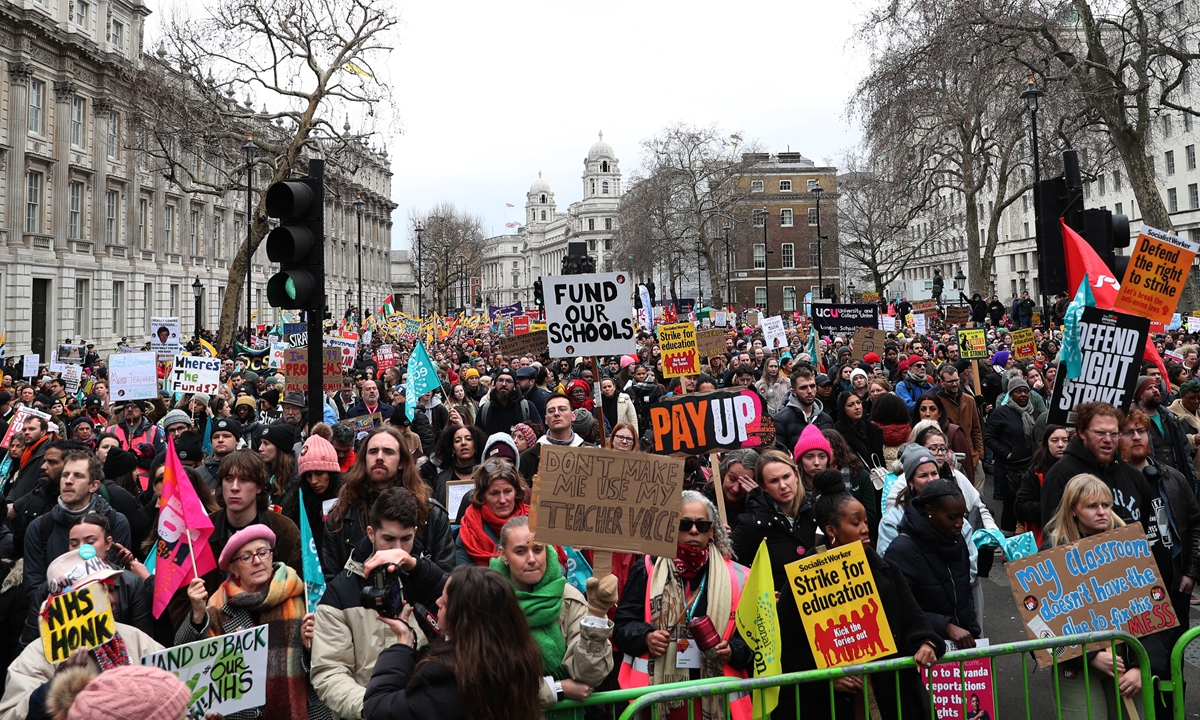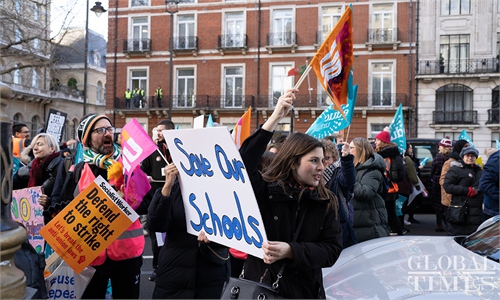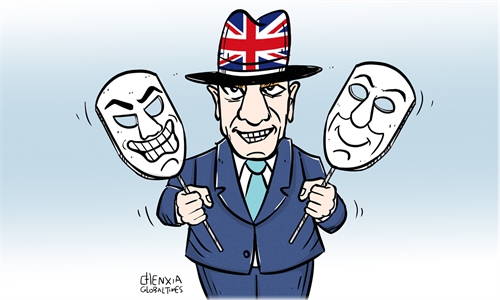London exploits international situation to show presence, but strikes lay bare true strength

National Education Union members and Education workers rally towards Westminster during a day of strikes across the UK, on February 1, 2023 in London, United Kingdom. Photo: AFP
The recent strikes in the United Kingdom are a wake-up call for Prime Minister Rishi Sunak, who on Thursday marks 100 days in office. It's hard to say how long he and his party can stay in power if London keeps exploiting the international situation to show its presence instead of effectively addressing the social problems at home and quelling people's growing discontent.
On Wednesday, around half a million teachers, civil servants, train drivers and other professions walked off their jobs over pay and conditions in the UK. It is reported that this is the largest strike since 2011. And GMB, one of the largest trade unions in Great Britain, announced healthcare workers in the UK, from nurses to emergency call handlers, will stage more strikes next week.
The UK has been facing increasingly severe livelihood crises since Brexit, with British people's living conditions getting worse. The country's domestic demand has been growing relatively slowly. And the ongoing Russia-Ukraine military conflict has caused a sharp rise in living costs across the West. In particular, the prices of energy and food skyrocketed due to the shortage.
Under the influence of internal and external factors, the UK's economic development suffered a massive shock in 2022, while its general economic situation deteriorated even faster. Inflation in the UK, for example, kept soaring in the first ten months of 2022, reaching a 41-year high of 11.1 percent in October.
Although the number slightly dropped in November and December after Sunak took office in late October and implemented policies to boost the economy and lower the inflation rate, it is clear that the general public's dissatisfaction with the British government grew way faster. This eventually led to the recent strikes for people to vent out their long-accumulated dissatisfaction.
But while facing severe problems at home, such as rising energy prices and high inflation, Britain is still sending aid to Ukraine to support it on the battlefield better. Gao Jian, director of the Center for British Studies at Shanghai International Studies University, told the Global Times that London has its own calculations to do so.
"Britain's foreign policy is now completely dependent on the US. Therefore, if the UK does not present itself as a 'fighter for democracy' on matters like the Russia-Ukraine conflict, its role as a pawn in the US global strategic system will continue to be marginalized," he noted.
Moreover, London's greatest fear is now that no one will care about it after it has lost its status as a main player in international affairs. As a result, the UK has to continue adopting a short-sighted approach of taking advantage of the Ukraine crisis to show its presence in the international arena.
Just take a look at how British politics has operated in recent years. All we see is confrontation and confusion. The ruling Conservative Party, representing mainly the British elite and the middle class, and the Labour Party, which represents the middle-lower classes, have been maintaining a competitive and even hostile relationship. This irreconcilable conflict between them has intensified dramatically over the years.
And due to the close ties between the Labour Party and the unions, the Conservative Party is and will remain firmly against strikes, let alone compromise with the unions. Thus, the antagonism between the unions and the British government will not be eased in any form. It is anticipated that the UK will see more confrontations.
The UK's politics has long lost its direction, making it more difficult to solve the livelihood problems of the British people. Many British politicians are busy engaging in political grandstanding and arguing and fighting their opponents in the parliament. Instead, they make no effort to look for practical solutions to the country's problems. At the same time, London, tightly clung to Washington, has shown a tendency to ideologize foreign affairs. Such a narrow vision has greatly expended the key elements of the development of the UK.
We should congratulate Sunak for "outliving" his predecessor Liz Truss as the UK's PM. But Sunak may soon come to his wit's end to find ways to stabilize British society. Experts believe that at present, Sunak or the Conservative Party still risks losing the power in the country's politics. However, be who is in power, under the trend where the UK keeps going downward in many aspects, no party or politician can make a significant change and save a desperate situation.



